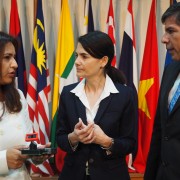The United States Government, represented by the U.S. Agency for International Development (USAID), invites qualified companies/individuals to submit technical and cost proposal of the services specified. This is to support the operation of Asia Regional Training Center (ARTC), USAID Regional Development Mission Asia in Bangkok Thailand.

In the increasingly integrated regional economy, businesses, especially small and medium-sized enterprises, will need to understand the benefits of the AEC. Along with that understanding, they will also need access to technology, innovation and finance that will help them take advantage of the opportunities the AEC offers. But businesses are made up of more than technology and capital. They are run by people. Businesses will also need a strong and vibrant workforce that will help them innovate and grow. And as you all know, ASEAN’s focus on human resource development is particularly important for the workforce of the newer ASEAN member states – Cambodia, Laos, Myanmar, and Vietnam. The good news is that these countries have booming economies and industries in ASEAN targeted sectors, such as tourism, food processing, electronics, and construction.

The United States Agency for International Development (USAID) today announced a new partnership with U.S.-based corporation, National Instruments (NI), to provide hands-on training to aspiring young scientists and engineers in the Lower Mekong sub-region and to empower them with technical skills to help grow the region’s workforce.
JAKARTA, May 4, 2015 – The Association of Southeast Asian Nations (ASEAN) Committee on Science and Technology and the U.S. Mission to ASEAN today announced a second group of fellowships to ASEAN scientists to further drive policy debates and data-based decision making to address some of the region’s most challenging development issues.
Advances in science have made it possible to end the AIDS epidemic by increasing access to HIV testing and antiretroviral medications among individuals facing the greatest risk of infection. In many countries across Asia and the Pacific, the greatest proportion of new HIV infections each year occur among men who have sex with men (MSM) and transgender women, yet the number of people in these populations accessing HIV services remains very low. With funding from the U.S. President’s Emergency Plan for AIDS Relief (PEPFAR), the U.S. Agency for International Development Regional Development Mission for Asia (USAID/RDMA) works to control the epidemic by using better methods to reach, test, treat and retain in clinical services for MSM and transgender women.







Comment
Make a general inquiry or suggest an improvement.